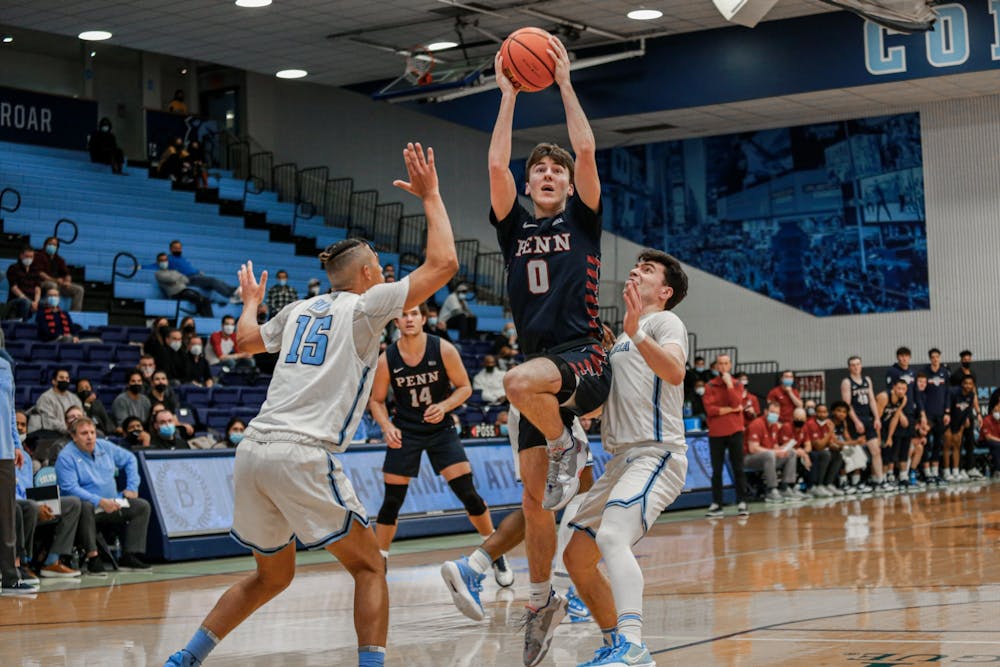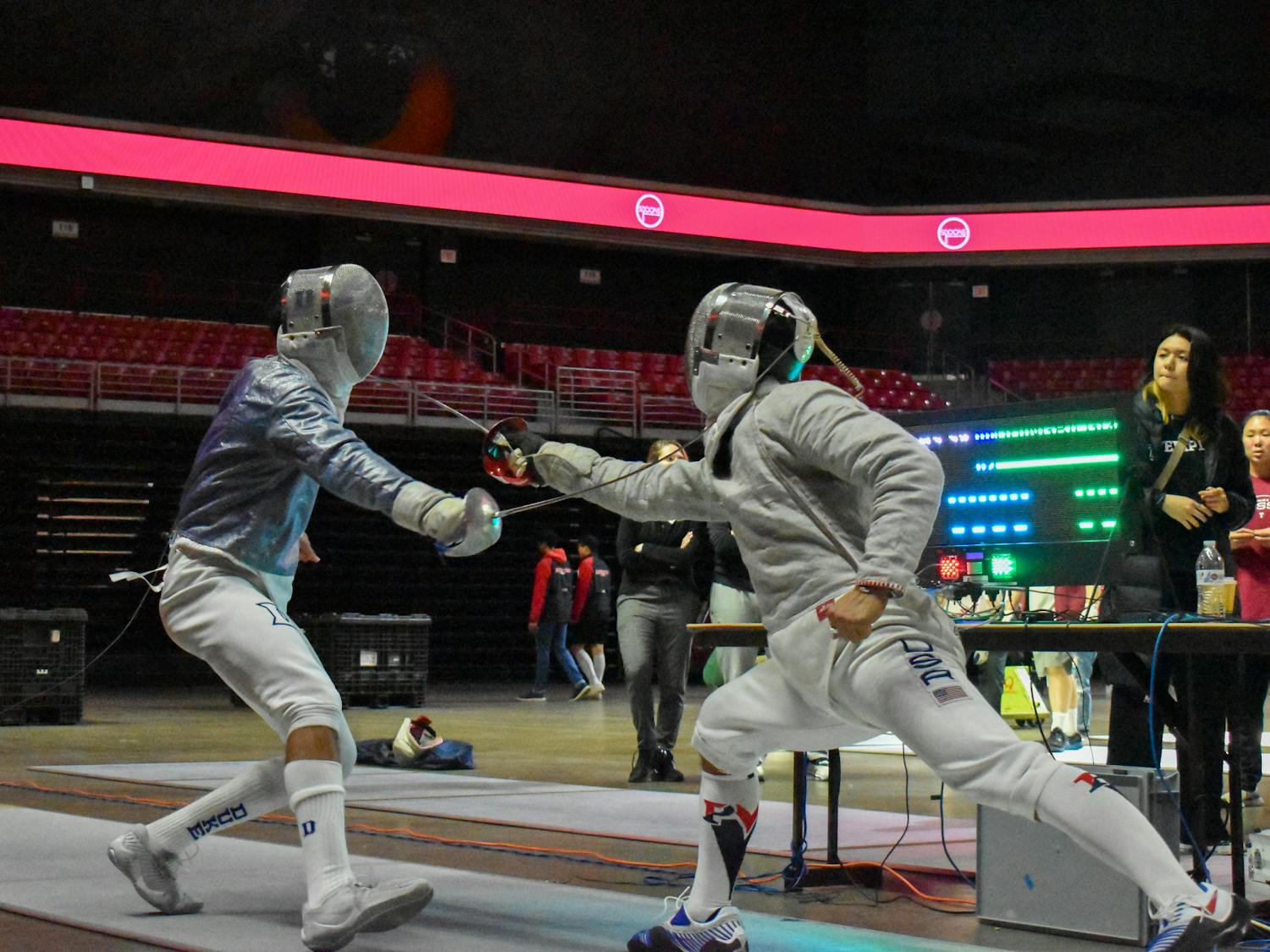ITHACA, N.Y. - There’s a lot to love about this Quaker team. The best thing, possibly? It clearly loves playing against teams in its own conference.
After starting out the season 3-10 and looking in dire need of some adjustments, Penn (10-12, 7-2 Ivy) has won seven of its last nine games — all against Ivy League opponents — and this weekend, managed to sweep its New York road trip, beating Columbia and, on Saturday night, Cornell (12-7, 4-4). In what was arguably the team’s best defensive performance of the season, the Red and Blue — which came in as a 2.5-point underdog — held Cornell to 68 points, one of its lowest totals of the season, and won by a 73-68 margin.
Against Columbia, sophomore forward Max Martz notched his season-high point total, and against Cornell, he scored the first six points of the game for the Quakers off a corner three and an and-one lay-in.
Martz, who finished the game with 16 points, was a crucial factor in Penn’s win, but the big breakout for Penn from this weekend’s games was sophomore forward Andrew Laczkowski, who, after scoring 12 points against Columbia (10 more than he’d scored against any other team in his Quaker career), played solidly again, this time against the Big Red. In his 22 minutes, by far the most he's played in a game so far in his Penn career, Laczkowski scored 10 points on 4-7 from the field and finished with a plus/minus of 18, the highest of any player in the game on either team.
“Going into every game, I just do what the coaches ask me to do and do what the team wants for us to win,” Laczkowski said. “Some days that’s playing three minutes, some days it’s playing more minutes, going up and down, especially a game like this against Cornell, where they run a lot of bodies. They play a really fast game, [so] just making sure I’m always ready.”
Being as inexperienced as Penn is, Laczkowski’s recent uptick in involvement is indicative of how Donahue’s treated much of this season: an opportunity to find out who on the team he can trust in different situations.
While Donahue has had to tinker a bit to find who on his team he can trust in big moments, Dingle, who tallied back-to-back 30-point games recently and put up 32 against Columbia, has been a constant. Surprisingly, though, the sophomore guard struggled out the gate. In the first half, Dingle found the basket only on a buzzer-beater to end the period after missing all four of his first field goal attempts.
The fact that the Red and Blue were still able to exit the first half with the lead, despite their star player finding himself ineffective offensively, was both a testament to other players stepping up when given opportunities and to Penn’s staunch defensive effort.
Cornell finished the half with a measly 22 points, going 8-27 from the field and 4-18 from deep. The Big Red, which also came off a back-to-back — albeit a home one — put up 46 points in the first half the previous night against Princeton. Open shots happening to not fall is certainly a factor in that trajectory, but the Quakers shrinking Cornell’s point total to half of what it was in its last game is an indicator of just how strong this team has been defensively, according to Donahue.
"I think in general, defense is something this team has done the whole year," Donahue said. "We played so many great teams early. I knew we had the potential to be a very good defensive team, and I thought we did that in the first half, and I actually thought we did most of the game."
The second half was where Penn really began to thrive offensively, putting up 44 points, 15 more than it did in the first half. The success, however, was not without some worrying moments.
With 13:37 left in the game and Penn up 14, Donahue seemed to lose his cool over a Penn reach-in foul he didn’t agree with and got himself a technical foul, which came in tandem with a double-technical on senior forwards Jelani Williams and Kobe Dickinson. In what could have been a turning point for the Big Red — which was desperately in need of a momentum shift — the Red and Blue went on a 8-2 run and brought their lead as high as 21.
In the second half, Dingle returned to being the player we’ve become accustomed to, scoring 16 points on 5-12 shooting.
Another key for Penn in this one — and in several other recent games — was its offensive rebound prowess. Against Cornell, the Quakers at one point led 11-2, though the Big Red grabbed the last four offensive boards of the game. For a team that’s biggest player with consistent minutes is Michael Moshkovitz at 6’7”, the ability to crash the glass has been not just a surprise, but a huge factor in the team’s recent success.
"Another thing we had trouble with last season and trouble in the preseason [with], and we just watch how Cornell sends all five guys," Donahue said. "So one thing we said [is] we're going to play more bodies, so we make sure we go after the ball, and then I think we knew how dangerous Cornell is on that glass … It's almost a different game than any other game you're going to play, and I thought the guys embraced that pretty well."
Despite Penn bringing the lead as high as it did in the second half, Cornell still had a shot at the end. With around a minute left, the Big Red cut it to a single possession and looked to have the crowd and the momentum on its side.
However, some crucial free throws from Martz and Williams, in addition to a timely Cornell turnover, swung the game in the Quakers' favor and allowed them to emerge with a 73-68 win.
The Red and Blue’s big win in Ithaca puts the series total at 161-75 in Penn’s favor, with Penn now having won five straight games against the Big Red.
The Quakers will look to continue their recent hot streak next Saturday at 2 p.m. in the Palestra against Harvard.









